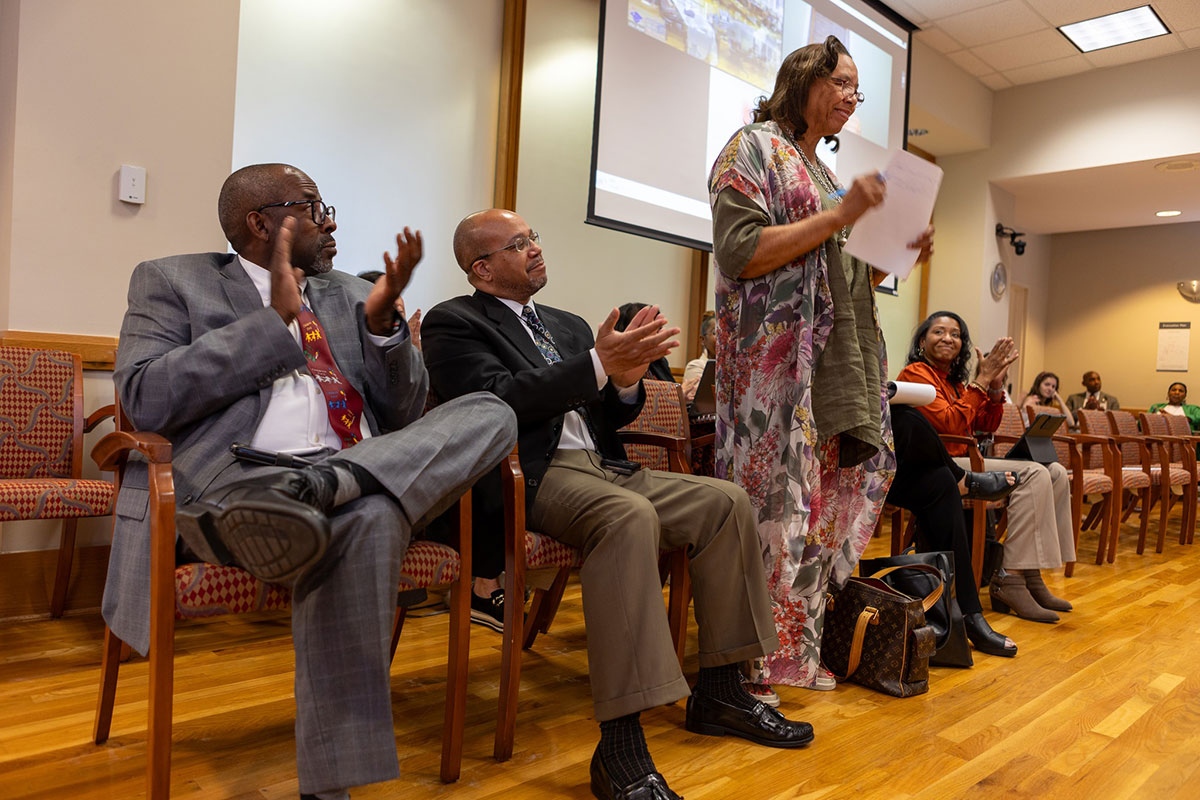Dr. Margie Pulley looked out at the sea of Tunica County School District students dressed in green and yellow shirts as she stood on a raised stage in the Paul Battle Arena. Lighted letter B’s flanked each side of the stage, representing the district’s accountability rating and likely the end of her tenure as superintendent. She adjusted her notes on the podium before speaking into the microphone.
“Good morning,” Pulley said as the hum of student voices quieted. “This is a celebration and we are going to celebrate the success of the Tunica County School District. We are celebrating teaching and learning.”
The district’s road to success, after struggling against failing scores before the conservatorship began nearly a decade ago, has not been easy.
Struggles Trace Back to Sabotaged Integration
Tunica, Miss., sits along Highway 61, often referred to as the Mississippi Blues Highway. When the soybean, cotton and corn fields suddenly drift out of sight, weathered buildings appear signaling drivers have entered the town. Shuttered businesses are scattered among others that are still operating. The outlet mall, a shell of its former self, sits as a reminder of the town’s once-booming economy.
At its peak, Tunica County boasted the third most profitable casinos between Atlantic City and Las Vegas. A 2019 Los Angeles Times article estimated that at one point the casinos employed more than 12,000 workers and brought in about $1.66 billion in revenue. The county dedicated 12% of that revenue to the public school system.

But a 1997 Mississippi Department of Education report found that the district had used the funds on non-instructional expenditures such as salary increases for personnel that had no direct effect on student achievement. At that time, the district had been among a small number to be assigned the State’s lowest accreditation level for eight of the previous nine years. The State took control of Tunica Public Schools for the first time that year.
“We can go back probably 20 years, and you’ll find nothing but decent D’s or F’s in Tunica County,” Pulley told the Mississippi Free Press.
Problems have plagued the district as far back as integration. Segregation lawsuits began in Mississippi around 1964. The following year, Tunica County attempted to show compliance with school integration using a “freedom-of-choice” plan, but by the 1967-1968 school year, only a dozen Black students had chosen to enroll in the formerly all-white schools.
In 1969, a U.S. federal court entered an order disapproving the freedom-of-choice plan and directed the school board to submit a better plan effective for the upcoming school year. That order also directed each of the district’s schools to ensure at least one of every six classroom teachers was of a different race than the others
On Jan 24, 1970, a final court decree allowed the district to assign students to schools based on zoning. It still required the district to assign principals, teachers and staff in a manner that created similar race ratios in each school, necessitating the reassignment of some teachers from schools where they had taught during the first semester. Within days, local white organizers notified white families that the private Tunica Church Schools would organize and open.
A lawsuit filed in July of that year said that on the first day of the second semester on Feb. 2, 1970, “no white child enrolled at any of the district schools.” Instead, the Tunica Church Schools opened with an all-white enrollment of 340 students and an all-white faculty of 21 teachers, 18 of whom had refused reassignment in the public schools. The school charged no tuition and teachers received no pay for their services during the second semester. The students used textbooks they brought with them from the public schools.
Tunica leaders had already founded the Tunica Institute of Learning in June 1964 as a white-only segregation academy. In the spring of 1970, it held its first high school graduation. Now called Tunica Academy, it continues to serve a predominately white student body of approximately 250 students in pre-kindergarten through 12th grade. Its website notes its history only by saying that “a group of prominent citizens had a vision to provide the students of Tunica County an alternative to public education.” It sits a half-mile away from Tunica Elementary and two miles away from Tunica Middle School and Rosa Fort High School, the public schools that serve the large majority of the county’s Black students.
‘She Had a Proven Track Record of Success’
The Mississippi Department of Education returned Tunica Public Schools to local control in 2002, five years after the 1997 state takeover. Less than 10 years later, the Mississippi Department of Education was again concerned with the state of the school district.
Interim Deputy Superintendent Mike Kent said that around the 2013-2014 school year, MDE began receiving numerous complaints from residents about failures in its special education program. A state audit found multiple violations of federal law regarding special education, in the district’s finances and other areas. The governor declared a state of emergency in the district and the State once again took control over it.
“They’ve been in conservatorship this time for close to I think it’s nine years,” Kent told the Mississippi Free Press on Oct. 10, 2023.

Enter Margie Pulley; she came to Tunica with a simple plan focused on teaching and learning. The district added an additional focus on safety after the pandemic, and those three values have guided the district’s rise, she said.
“When I came in July 2015, there were 25 violations of the 31 process standards, so we had to clear the standards to ensure that every student graduates high school and is college- and career-ready,” Pulley told the Mississippi Free Press on Oct. 4, 2023. “We’ve made significant strides in the graduation rates, encouraged parent and community involvement and promoted health, wellness and safety at our school sites. Those were the goals, and we’ve stuck with those goals. We haven’t wavered from that.”
Pulley’s no-nonsense style is borne out of 50 years of work in the education field. She worked as a teacher, administrator and superintendent in the Mississippi Delta for most of her career.
“She was successful when she was a superintendent in Greenwood,” Kent told the Mississippi Free Press. “She has served previously as a conservator in Oktibbeha County, and so she had … a proven track record of success. And that’s what you’ve got to have because that person is about to go in and make all the decisions moving forward.”
Notes and papers litter Pulley’s current desk. A variety of books line a large bookshelf. Folder boxes filled with files stand in a corner.
“I’m not gonna make any apologies for my office because I got a working office,” she said.
Using a PowerPoint presentation she had prepared for stakeholders, Pulley explained the district’s progress to the Mississippi Free Press. Under her leadership, Tunica began slow yet steady improvement in finances and academic achievement. When she took over as conservator, the district had a D rating. Graduation rates sat at 57.3%. The district bank account had only $5,212,000.
Under Pulley’s leadership, those rates changed. By the 2017-2018 school year, the district had earned a C rating. The next year, Tunica ranked second in the state in graduating students with disabilities. In 2020, the district boasted a 93.1% graduation rate and was rated top 10 in the state.
Now eight-and-a-half years since she took the reins, the district has earned a B rating for the second year in a row. Pulley credits the hard work of teachers and students with high-quality instructional materials and resources.
“Our research-based instructional model is explicit direct instruction,” Pulley said. “That’s what’s implemented in all the classrooms. We have formative assessments that teachers can use in the classroom, and the district uses assessments to see where our kids are to be able to provide the remediation they may need to become successful in the classroom.”
The district has also made improvements outside the classroom. Schools now have 45 new air-conditioned buses and nine new district vehicles. The district erected a new transportation facility and completed necessary building repairs at each school. New security interlock systems protect students and staff at all of the district schools.
The improvements put the school district on a course to be released from state conservatorship. State law gives MDE the authority to return a state-run district to local control when the district has corrected all its deficiencies and has improved its academic performance. In November 2022, the Mississippi Board of Education selected an advisory board to assist Pulley throughout 2023 as the district begins the transition to local governance.
“The State Board of Education has got to decide that they’re going to ask the governor to remove or release them from the state of emergency,” Kent said. “Then the governor would have to lift the state of emergency and then this advisory board that is currently in place would begin operating as a full-fledged school board. The first thing that they would need to do is hire a superintendent.”
Kent said the board will likely vote to end the state of emergency in December. The matter would then go to the governor. The district is likely to return to local control in January 2024.
“Based on the amount of success that Dr. Pulley and Tunica have had over the last four or five years, they are a poster child for how you take a failing district and turn it around,” Kent said.










